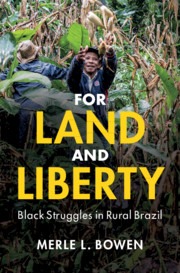Book contents
- For Land and Liberty
- Cambridge Studies on the African Diaspora
- Dedication
- For Land and Liberty
- Copyright page
- Contents
- Illustrations
- Abbreviations
- Acknowledgments
- Introduction
- 1 History, Heritage, and Resistance
- 2 Ethnic Cultural Politics Trumps Black Land Rights
- 3 Quilombola Recognition and Criminalization of Blackness
- 4 Land, Labor, and Livelihoods
- 5 Ethnic Tourism and the Commodification of Quilombola Culture
- Conclusion
- References
- Index
Introduction
Published online by Cambridge University Press: 21 April 2021
- For Land and Liberty
- Cambridge Studies on the African Diaspora
- Dedication
- For Land and Liberty
- Copyright page
- Contents
- Illustrations
- Abbreviations
- Acknowledgments
- Introduction
- 1 History, Heritage, and Resistance
- 2 Ethnic Cultural Politics Trumps Black Land Rights
- 3 Quilombola Recognition and Criminalization of Blackness
- 4 Land, Labor, and Livelihoods
- 5 Ethnic Tourism and the Commodification of Quilombola Culture
- Conclusion
- References
- Index
Summary
Today, black rural communities across Brazil are seeking legal rights to land they have inhabited for generations. This is not a new struggle. Enslaved Africans brought to the country and their descendants have long sought access to land and striven to be independent agrarian producers, in and out of slavery. Land, they have long believed, is the basis of liberty. Then, as now, land and labor were linked. Abolition in 1888 resulted in freedom for enslaved Africans and their descendants, but was not accompanied by land reform, reparations, or other forms of compensation. There was no structural change to Brazil’s racialized and concentrated landownership. Along the way, the Brazilian government has implemented policies to confiscate land that black communities historically settled, and it has denied Afro-descendants access to other resources they need for their livelihoods, thereby exacerbating racial inequality. Even so, black rural communities have challenged territorial dispossession by the Brazilian state, landed elite, and agribusiness through legal recourse, including claims predating emancipation, as well as long-term occupancy and histories of resistance to slavery and racial discrimination. But these efforts have had only mixed success. After centuries of political and economic exclusion, black rural communities deserve land reparations for slavery and for the ongoing seizure of territory that they have legitimately occupied.
- Type
- Chapter
- Information
- For Land and LibertyBlack Struggles in Rural Brazil, pp. 1 - 25Publisher: Cambridge University PressPrint publication year: 2021



